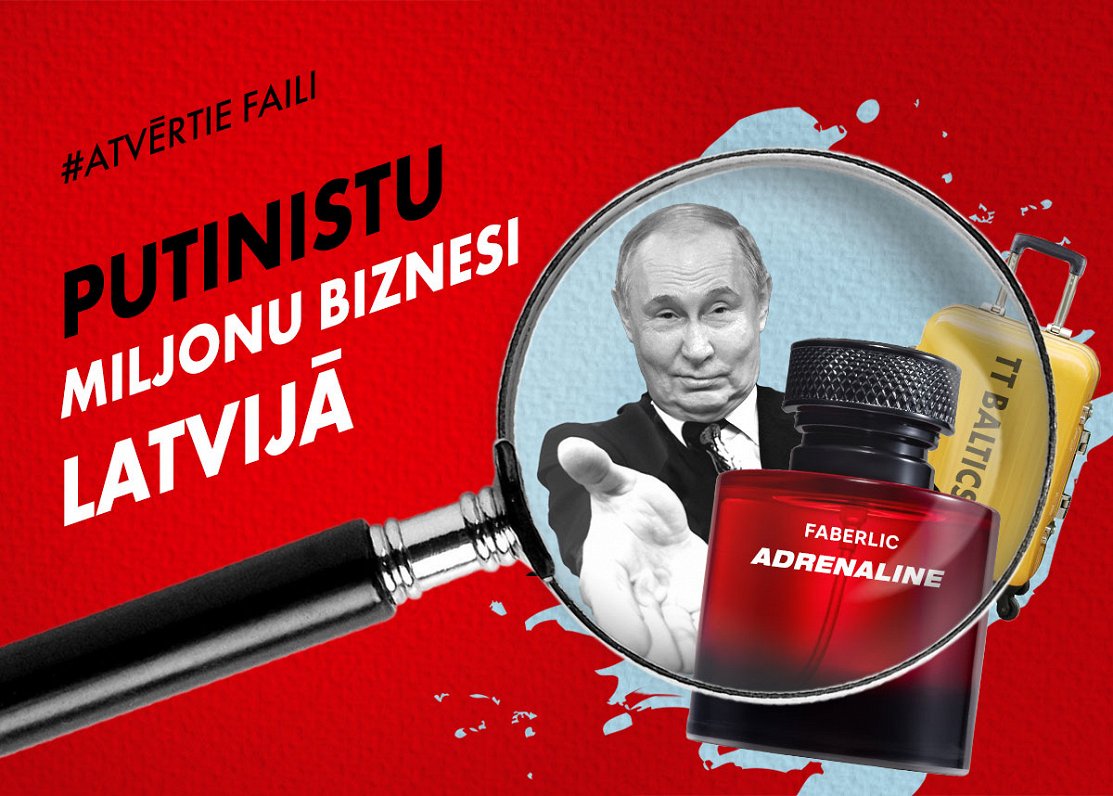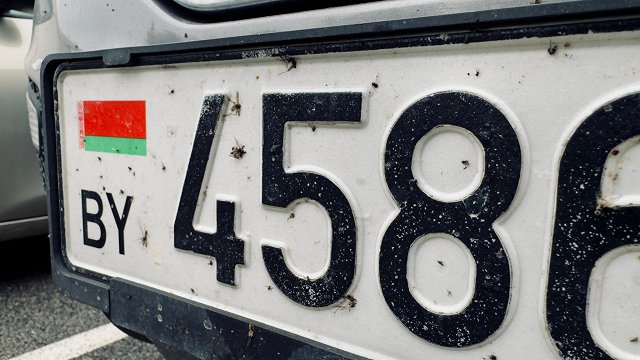Among them are oligarchs and politicians, as well as shareholders of companies strategically important to Russia. Their companies, which sold lifestyle goods, have turned over tens of millions of euros in Latvia. These same businessmen in Russia supported the bloody invasion of Ukraine with their decisions, money, and business ties, said Latvian Radio's 'Open Files' (Atvērtie Faili) investigative program.
Faberlic
Faberlic brand goods - mostly perfumes and decorative cosmetics - entered Latvia 20 years ago. Shortly before that, the brand name was "Russian Line". However, "Faberlic Baltija" is not an ordinary beauty care company. It belongs to the public joint-stock company "Faberlic" registered in Russia, which is one of the largest manufacturers of hygiene and cosmetic products in the neighboring country. Its owner is Aleksey Nechayev, a member of the Russian State Council.
Nechayev is one of the MPs who supported Putin's decision to recognize the self-proclaimed Donetsk and Luhansk People's Republics as independent states two days before Russia's bloody invasion of Ukraine. These are not his only links with the Russian dictator – Nechaev also belongs to the pro-Putin "All-Russian People's Front". It is a so-called "umbrella organization" that unites political and social movements that support the Putin regime.
Not only the European Union but also several individual countries have imposed sanctions against Nechaev.
Before the application of sanctions, Nechaev's business in Latvia was successful – the turnover was constantly increasing, and in recent years it reached 20 million euros. In the company's annual reports, we read that it had around 130 employees.
Although "Faberlic Baltija" cannot operate in Europe due to sanctions and it has been declared insolvent in Latvia, the other Faberlic brand companies owned by Nechayev have spread elsewhere in the world, for example in Georgia, Armenia, Mexico and Mongolia.
In order to understand how "Faberlic" works, Latvijas Radio met with the head of the Association of Marketing Professionals of Latvia, Valters Kaže who said: "We are talking about a business model that is based on direct distribution and the creation of a multi-level agent network."
It is a multi-level marketing business model. "In this case, this direct sale is not limited to reaching his [immediate] circle, but the agent can also attract other agents who work for him as his team. So such sub-agents are, if you could say, the next level," explained Kaže.
This allows you to earn more. "In essence, they receive a certain part of the commission from what their subordinates have earned," Kaže said.
This creates several levels. And the basic principle is simple – the more agents you attract and the more successfully they work, the more you get. In some ways, it is similar to the business model pioneered by companies such as Avon in the West from the 1950s, in which sellers would offer cosmetics to their circle of friends and acquaintances – though that was long before the days of online purchasing and social media.
"For example, I have ten clients, each of them buys cosmetics worth 20 euroseach month, I have sold 200 euros, I get my commission. I don't get much, especially if I give part of that commission to the next level for the fact that people support me, train me, work with me every day," Kaže said.
In such companies, the multi-level system serves to motivate employees. "Achieving a higher sales volume, their status is strengthened with a certain bonus, for example, they get a car with the company's support. [...] Of course, a logo with an advertisement would be stuck on there so that the car can still serve the company's interests," said Kaže.
However, the number of sales levels is not infinite: "In principle, it is proportionally more difficult to reach them when moving up. Those who have, of course, reached the top, have a very large business, one could say, and the income is high, but getting there is not easy, it takes a lot of effort."
Kaže added that a business approach like Faberlic's is focused on constant involvement and motivation of employees: "But it also puts a lot of pressure on because you have to know the products well, the entire franchise of these products, the product descriptions must very accurate, the sales pitch too, with neither a step to the right, nor a step to the left, the consistency of the brand must be maintained."
Employee trips were regularly organized by the company as rewards and incentives. One of these was held in Russia in 2012 in honor of the company's 15th anniversary. As you can see in video of the event, it was also attended by representatives from Latvia.
The director of the company's network development, Konstantins Barmashov, took the stage. He had wrapped a "Faberlic" scarf around his shoulders and gave a speech dedicated to the Russian 'Victory Day' celebrations of May 9 to the cosmetics dealers. Barmashov himself is now the general director of the company.
On May 9 of this year, a video excerpt from this speech was re-published on the company's social media accounts:
"We must become very strong with you, our country must become very strong again. [...] You and I must do much more and not only ourselves, but also for the sake of his country," thundered the distributor of hand creams and facial scrubs.
The 10-minute speech is interspersed with shots of a Russian tank, the Red Army flag and the "Victory Column" in Berlin. At the end of the video, a war march is played and a large Faberlic logo appears on the screen. "War still lives in our blood, so does victory, life and heroism. You know what I value most at Faberlic is that, although I'm here to talk about business, I can share these feelings with you, it is the most important thing for me! I probably wouldn't be able to do this in any other company," Barmashov rails in the video.
TT Tours
Leonids Močeņovs, who is now a procurator or authorized representative of the tour company "Itaka Latvija", was previously a member of the board of the tour company "TT Baltics" owned by the Russian billionaire Alexey Mordashov. A couple of years ago, it opened on Krišjāņa Barona Street in central Rīga, offering mainly cut-price trips to warm countries, such as Turkey and Egypt.
But Mordashov's business is not limited to tourism. In Latvia, he also owned the "Severstal Distribution" metalworking factory for a long time while in Russia he is the largest shareholder of the investment company "Severgroup". Its daughter company, public joint-stock company "Severstal" supplies special metal products, including steel armor, to the Russian military.
Mordashov is also one of the founders of "National Media Group". It is the largest media holding in Russia, controlling many television channels that actively spread Kremlin propaganda and support Russia's invasion of Ukraine. Last year, journalists also revealed that Mordashov bribed a German journalist to write books praising Putin.
"TT Baltics" worked successfully in Latvia and before the pandemic had a turnover of just less than 40 million euros per year, which is more than others in the industry. In 2020, this amount dropped to 8 million in Latvia, but there is no information about the financials since, as the company has not submitted activity reports.
With the beginning of the war, sanctions were applied to "TT Baltics" and the money in its accounts is still frozen.
At the moment when Mordashov's tour company was subjected to sanctions, misfortunes befell its large clientele as well.
At that time, some of the company's clients were on trips organized by the company, most of them in Egypt, others in the Canary Islands and Turkey.
"A total of 1,565 travelers [...] who had stayed abroad were returned, and nine flights were organized to send people back," said Baiba Vītoliņa, director of the Consumer Rights Protection Center (PTAC).
PTAC was one of the institutions that helped the tour company's customers to get back money paid for trips that did not take place. "The amount was approximately over two million [euros]. The number of customers, I think, was around 24 thousand," said Vītoliņa.
This process ended only a couple of months ago. Why did it take more than a year and a half? "From our point of view, the main problem was perhaps the fact that this company was very sloppy with its internal accounting," revealed the director of PTAC.
Vītoliņa pointed out that there was a lack of a good document management system: "It was very difficult for them to find out how many customers they have in general and how much they have paid, and for which trips. And that was the most complicated thing. In fact, when these lists were created, some people were [included] twice, other people were not there at all."
During this process, PTAC received a lot of customer complaints, including from citizens of Estonia and Lithuania who had also used the company's services. "We really had one person who, in principle, only dealt with this for the past two years," Vītoliņa admitted.
Refunds to customers are now complete. Vītoliņa emphasized that the most important thing in this situation is that everyone who asked for a refund has now received it: "This was a company that was not insolvent... the money in the accounts was completely enough to cover these obligations."
The people mentioned above are not the only ones who are close to Putin and the Kremlin who have business links in Latvia. At least seven other persons are also on the sanctions lists, Latvian Radio said.
What does it mean if you look at the business ties of people close to Putin in Latvia? Elina Vrobļevska, a researcher at the Eastern European Policy Research Center, spoke to Latvian Radio.
In her opinion, what are the business interests of Russian billionaires in Latvia? "First of all, it is the business environment, business culture, something known, something understandable. With the fact that we are in the European Union, Latvia is safe enough, stable enough. [...] We are once again a window to Europe. "
Although the owner of "Faberlic" supported Putin for a long time and the company regularly celebrated Victory Day, as well as spread war propaganda at events, Latvian residents – the company's employees – cooperated with it anyway. "Mercantile considerations, work, income. Well, at some point, people have such a survival instinct," commented Vrobljevska.
Another important aspect that she drew attention to is how critical and receptive employees were to the information they were offered:
"Obviously, any good employee like that, he develops a certain loyalty to his employer. And of course, these outings and fun [activities] only strengthen that loyalty."
Therefore, the messages spread by such companies coming from a neighboring country should be evaluated very carefully and critically. "Of course, on the part of the Russian propaganda machine, you have to understand that they will use any opportunity to reach a large audience, especially if it's a foreign audience. If it's the Baltic states, if it's probably Poland, and really any other listening ears that might be particularly susceptible to any kind of information manipulation, misinformation, propaganda and other tricks, they are very actively used," said the expert.
































